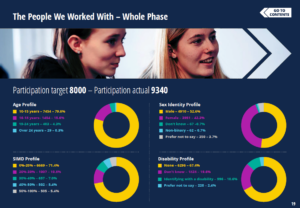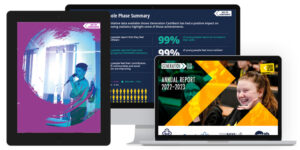This is the story of Generation CashBack Phase 5 Year 3
As we entered Year 3 of Phase 5, both youth workers and young people were relieved that face to face youth work appeared likely to continue without further lockdowns on the horizon. Most groups had managed to get back up and running and were planning summer programmes that would support young people to socialise, build confidence, and have fun. However, young people and youth workers were still dealing with the mental health and wellbeing implications of the pandemic, including higher rates of social anxiety, isolation, and low self-esteem.
The disruption that Covid caused to education left many young people feeling disengaged from school, less confident in their ability to secure qualifications, and exhibiting risk-taking behaviour. Coupled with this, the cost of living crisis brought further pressure to parents and carers, many of whom struggled to provide adequate meals and heated homes for their young people. This was particularly felt in the communities where Generation CashBack works, where there are already a high number of low-income families. Youth groups in these areas were also affected by the crisis, with venue rent, bills, and materials costs increasing, and in some cases, services were in danger of closure.
The demand for Generation CashBack support continued to rise and youth groups provided much needed warm spaces and meals to young people across Scotland. Generation Cashback Development Officers continued to support youth groups through a mix of capacity building support for workers, and direct delivery to young people.
Some key achievements in during this period were:
- 98% of young people reported Generation CashBack having a positive impact on their behaviour
- £331,441 the economic value of voluntary activity generated by young people throughout Year 3
- 93% of young people reported improved wellbeing (against SHANARRI indicators)
- 98% of young people felt more resilient through the programme

